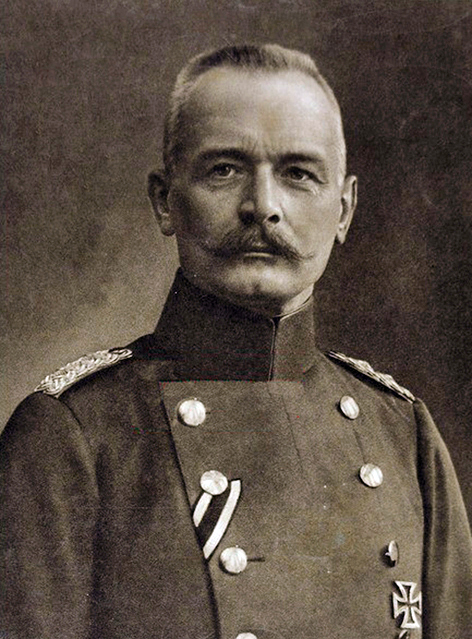
Erich von Falkenhayn
General Erich Georg Sebastian Anton von Falkenhayn (11 September 1861 – 8 April 1922) was a German general who was the second Chief of the German General Staff of the First World War from September 1914 until 29 August 1916. Falkenhayn replaced General Helmuth von Moltke the Younger after his invasion of France was stopped at the First Battle of the Marne and was in turn removed on 29 August 1916 after the failure of his offensive strategy in the west at the Battle of Verdun, the opening of the Battle of the Somme, the Brusilov Offensive and the Romanian entry into the war. Having planned to win the war before 1917, the German army was reduced to hanging on.
Erich von Falkenhayn
11 September 1861
Burg Belchau, Kingdom of Prussia, German Confederation (now Poland)
8 April 1922 (aged 60)
Potsdam, Prussia, Weimar Republic
Ida Selkmann
Eugen von Falkenhayn (brother)
Fedor von Bock (nephew)
Henning von Tresckow (son-in-law)
2
Military officer
![]() German Empire (1880–1919)
German Empire (1880–1919) ![]() Ottoman Empire (1917–1918)
Ottoman Empire (1917–1918)
1880–1919
![]() General der Infanterie (Imperial German Army)
General der Infanterie (Imperial German Army)![]() Field Marshal (Ottoman Army)
Field Marshal (Ottoman Army)
Chief of the German General Staff
9th Army
Army Group F (Ottoman Army)
10th Army
Falkenhayn was given important field commands in Romania and Syria. His reputation as a war leader was attacked in Germany during and after the war, especially by the faction supporting Field Marshal Paul von Hindenburg. Falkenhayn held that Germany could not win the war by a decisive battle but would have to reach a compromise peace; his enemies said he lacked the resolve necessary to win a decisive victory. Falkenhayn's relations with the Chancellor Theobald von Bethmann Hollweg were troubled and undercut Falkenhayn's plans.
Early life[edit]
Falkenhayn was born in Burg Belchau, a village near Graudenz, now Białochowo in Poland, to Fedor von Falkenhayn (1814–1896) and Franziska von Falkenhayn, née von Rosenberg (1826–1888). His ancestors could be traced to 1504.[1] His brother Arthur (1857–1929) became tutor of Crown Prince Wilhelm and another brother Eugen (1853–1934) became a Prussian General of Cavalry. His only sister Olga von Falkenhayn was the mother of Field Marshal Fedor von Bock.[2]
Retirement[edit]
In 1919, Falkenhayn retired from the army and withdrew to his estate, where he wrote his autobiography and several books on war and strategy. His war memoirs were translated into English as The German General staff and Its Critical Decisions, 1914–1916 (1919).[30] With the benefit of hindsight, he remarked that the German declarations of war on Russia and France in 1914 were "justifiable but overly-hasty and unnecessary".[31] Falkenhayn died in 1922, at Schloss Lindstedt, near Potsdam and was buried in Potsdam.[3]
Family life[edit]
In 1886, Falkenhayn married Ida Selkmann, with whom he had a son, Fritz Georg Adalbert von Falkenhayn (1890–1973), and a daughter, Erika Karola Olga von Falkenhayn (1904–1975), who married Henning von Tresckow (1901–1944), a general who participated in the 20 July plot to assassinate Hitler.[32]
Assessment[edit]
Falkenhayn in many ways typified the Prussian generals; a militarist in the literal sense, he had undeniable political and military competence and showed contempt for democracy and the representative Reichstag. He addressed the Reichstag in 1914, saying, "Only through the fact that the Prussian army is removed by the constitution from the party struggle and the influence of ambitious party leaders has it become what it is: the secure defence of peace at home and abroad".[33] Militarily, Falkenhayn had a mixed record. His offensive at Verdun proved a strategic failure. During the campaign against Romania in 1916 Falkenhayn demonstrated considerable skill in command of the German 9th Army, driving the Romanians from Transylvania, breaking through the Southern Carpathians and forcing the shattered Romanian forces north-east into Moldavia.[34]
Winston Churchill considered him to be the ablest of the German generals in World War I. Trevor Dupuy also ranked him near the top of the German commanders, just below Hindenburg and Ludendorff.[35] Robert Foley wrote that Germany's enemies were far more able to apply a strategy of attrition, because they had greater amounts of manpower, industry and economic control over the world, resorting to many of the methods used by Falkenhayn in Russia in 1915 and France in 1916. As the cost of fighting the war increased, the war aims of the Entente expanded, to include the overthrow of the political elites of the Central Powers and the ability to dictate peace to a comprehensively defeated enemy, which was achieved by a strategy of attrition.[36]
During his term as the Chief of the General Staff, one staff officer wrote that Falkenhayn had lacked decisiveness and foresight in the matters of organization and tactics.[37] All sources portray Falkenhayn as a loyal, honest and punctilious friend and superior. His positive legacy is his conduct during the war in Palestine in 1917. As his biographer Holger Afflerbach wrote, "An inhuman excess against the Jews in Palestine was prevented only by Falkenhayn's conduct, which against the background of the German history of the 20th century has a special meaning, and one that distinguishes Falkenhayn".[38]